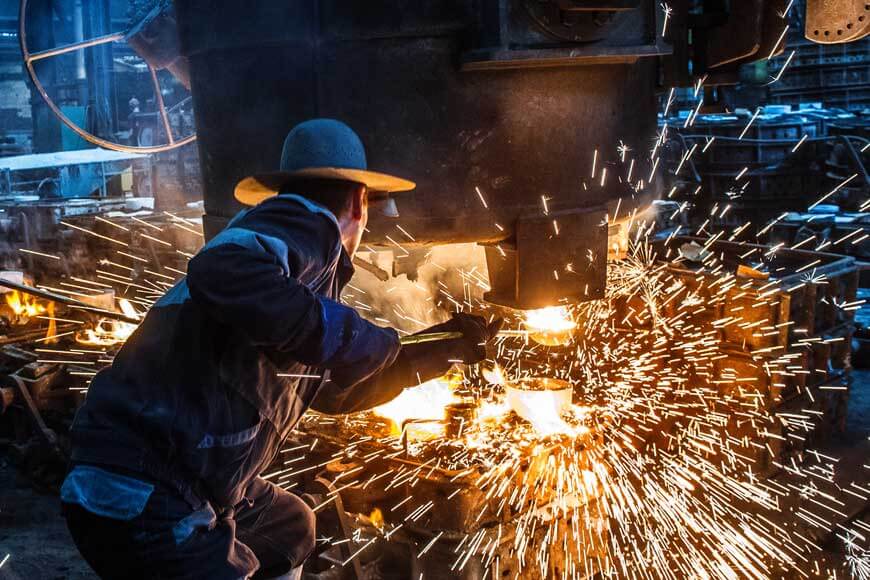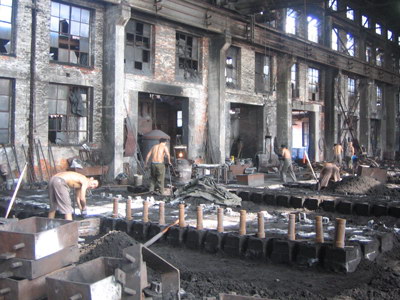Why choose an Aluminum Foundry the preferred choice for precision manufacturing
Wiki Article
Discovering the Function of a Metal Foundry in Modern Production Processes
Metal foundries are essential in the landscape of modern manufacturing. They provide essential elements throughout various fields, adapting to the demands of markets like vehicle and aerospace. Advanced methods such as 3D printing and automated casting have changed their operations. Additionally, sustainability has actually come to be a concern, influencing their techniques. As these foundries advance, the ramifications for making efficiency and technology are substantial, elevating questions regarding their future trajectory in an ever-changing economy.The Development of Metal Casting Methods

With the increase of mass manufacturing, foundries took on approaches like die casting and lost foam casting, improving the production procedure and lowering waste. Each evolution in metal casting techniques has satisfied the requirements of numerous sectors, from auto to aerospace. As metal casting remains to advance, the interplay between technique and technology remains crucial in meeting modern manufacturing difficulties, making sure that foundries adjust and prosper in an ever-changing landscape.
Combination of Advanced Technologies in Foundries
Typical metal casting approaches have actually served the industry well for centuries, the integration of innovative modern technologies in foundries is reinventing the manufacturing landscape. Automation and robotics improve production procedures, improving effectiveness and reducing the threat of human mistake. Technologies such as 3D printing enable rapid prototyping and the development of intricate geometries that were once difficult with conventional techniques. In addition, information analytics and the Web of Points (IoT) make it possible for real-time tracking and anticipating upkeep, inevitably causing decreased downtime and raised performance. These improvements also help with personalization, allowing producers to react quickly to market demands. As sustainability ends up being a priority, the fostering of eco-friendly modern technologies, such as electric melting furnaces and progressed sand improvement systems, additionally demonstrates the industry's commitment to advancement. Jointly, these innovations not just improve functional performance however additionally position foundries at the leading edge of modern-day manufacturing techniques.The Impact of Material Scientific Research on Foundry Operations
Material scientific research plays a crucial role in improving shop procedures, affecting both the choice of materials and the general casting procedure. Breakthroughs in product science offer a deeper understanding of the residential properties of steels and alloys, enabling foundries to pick one of the most appropriate materials for details applications. This expertise enhances the performance and longevity of actors products, which is important for meeting industry standards.Moreover, advancements in product solutions and ingredients add to boosted casting strategies, optimizing and lowering flaws production effectiveness. The development of innovative metal composites and wise materials enables foundries to generate lighter, stronger elements, which are increasingly sought after in numerous fields such as automobile and aerospace.
Furthermore, material science help in the recycling of metals, making procedures more efficient and economical. By leveraging the current findings in product scientific research, foundries can adapt to advancing market needs, ensuring their competition in a quickly changing production landscape.
Sustainability Practices in Modern Metal Foundries
With the growing emphasis on environmental responsibility, modern metal foundries are significantly executing sustainability practices to lessen their ecological impact (Aluminum Casting). One crucial method entails the recycling of scrap metal, which not only lowers waste however additionally conserves power and resources. Foundries are adopting advanced melting technologies that enhance energy efficiency, consequently lowering greenhouse gas discharges. Furthermore, making use of eco-friendly finishings and materials has acquired traction, further reducing damaging exhausts during productionWater preservation techniques, such as closed-loop cooling systems, are being applied to minimize freshwater usage. Several foundries are additionally investing in sustainable power sources, like solar and wind, to power their operations, consequently lowering reliance on fossil fuels. Moreover, personnel training programs concentrated on sustainability methods promote a society of ecological understanding within the workforce. These efforts collectively add to a much more sustainable future for metal foundries while fulfilling the needs of eco-conscious consumers.
The Future of Foundries in a Transforming Economic Landscape
As the global economic situation progresses, foundries face a myriad of obstacles and chances that will form their future (Aluminum Casting). The enhancing need for light-weight materials and progressed alloys necessitates technology in manufacturing techniques and technical integration. Automation and clever manufacturing methods are becoming necessary for enhancing performance and decreasing functional prices. Additionally, the rise of sustainability problems obliges foundries to take on greener processes and reusing campaigns, lining up with international environmental goalsThe financial landscape is also moving, with supply chain disturbances and fluctuating basic material prices presenting considerable difficulties. Foundries must adapt by expanding their supply resources and purchasing materials scientific research. In addition, collaboration with markets such as eco-friendly power and electric cars can promote development. Inevitably, the future of foundries will certainly rely on their ability to leverage technological innovations while remaining responsive to market dynamics and ecological imperatives, ensuring their importance in contemporary manufacturing.
Regularly Asked Concerns
What Kinds of Metals Are Commonly Utilized in Foundries Today?
Generally used steels in foundries today consist of light weight aluminum, iron, copper, zinc, and steel. These products are favored for their diverse residential properties, making it possible for a large array of applications in markets such as automotive, aerospace, and construction.Exactly how Does a Factory Make Certain Top Quality Control in Its Products?

What Precaution Are Applied in a Metal Foundry?
Metal foundries execute safety and security steps consisting of personal safety tools, ventilation systems to minimize inhalation of fumes, routine safety and security training for employees, emergency situation feedback procedures, and strenuous equipment maintenance to lessen risks and guarantee a safe workplace.Exactly how Long Does the Metal Casting Refine Commonly Take?
The metal casting procedure usually takes a number of hours to days, depending on variables such as the intricacy of the mold and mildew, the sort of metal used, and cooling down times. Each job's demands greatly affect the duration.What Industries Largely Rely Upon Metal Foundries for Production?
Automotive, aerospace, equipment, and construction industries mainly depend on metal foundries for production. These markets make use of cast metals for elements, making certain sturdiness and efficiency essential for their particular applications in production and setting up processes.
Metal foundries are critical in the landscape of modern-day production. Aluminum Foundry. Traditional metal casting techniques have actually offered the sector well for centuries, the integration of Aluminum Casting advanced innovations in foundries is reinventing the production landscape. Breakthroughs in material science offer a deeper understanding of the properties of alloys and metals, allowing foundries to choose the most appropriate materials for certain applications. With the expanding focus on ecological duty, modern-day metal foundries are significantly implementing sustainability practices to minimize their ecological footprint. Automotive, aerospace, equipment, and building and construction industries primarily depend on metal foundries for production
Report this wiki page